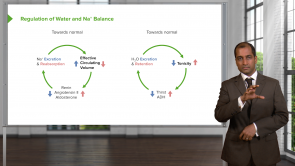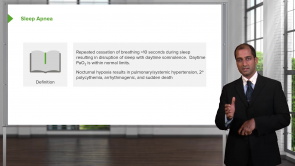Tubular Transport by Nephron Segment
Über den Vortrag
Der Vortrag „Tubular Transport by Nephron Segment“ von Carlo Raj, MD ist Bestandteil des Kurses „Nephrology: Foundations“.
Quiz zum Vortrag
Which of the following is not true regarding the transport at the proximal convoluted tubule?
- Reabsorption of almost 80% of bicarbonate occurs directly at the PCT.
- Reabsorption of almost 100% of glucose occurs at the PCT.
- Sodium-potassium ATP pump is affected during the ischemia of PCT.
- Reabsorption of almost 80% of bicarbonate occurs indirectly at the PCT.
- Carbonic anhydrase leads to the formation of carbon dioxide and water, which gets absorbed and converted into bicarbonate in the epithelial cell of the PCT.
In high altitude sickness, a drug is given in order to facilitate metabolic compensation. Which of the following statements is true?
- Acetazolamide inhibits carbonic anhydrase, that leads to the inhibition of bicarbonate formation.
- Acetazolamide stimulates carbonic anhydrase, that leads to the inhibition of bicarbonate formation.
- Acetazolamide inhibits carbonic anhydrase, that leads to the stimulation of bicarbonate formation.
- Acetaminophen inhibits carbonic anhydrase, that leads to the inhibition of bicarbonate formation.
- Acetaminophen stimulates carbonic anhydrase, that leads to the inhibition of bicarbonate formation.
What region of the nephron has the most hypertonic urine without the influence of a hormone?
- Medullary loop of Henle
- Cortical collecting duct
- Distal convoluted tubule
- Medullary collecting duct
- Cortical loop of Henle
Which drug is responsible for inhibiting the sodium, potassium, and chloride reabsorption in the thick ascending limb of the loop of Henle?
- Furosemide
- Famotidine
- Metolazone
- Spironolactone
- Chlorthalidone
Which of the following drugs could be given with a loop diuretic to keep the resting membrane potential intact?
- Spironolactone
- Chlorthalidone
- Metolazone
- Acetazolamide
- Acetaminophen
Which of the following facilitates paracellular reabsorption of magnesium and calcium in the thick ascending limb of the loop of Henle?
- Back-leak of K+
- Back-leak of Na+
- Back-leak of Cl-
- Back-leak of H+
- Back-leak of HCO3-
Which of the following is true regarding the effects of parathyroid hormone on the metabolism of calcium and phosphate?
- Reabsorption of calcium in the DCT, and inhibition of reabsorption of phosphate in the PCT
- Reabsorption of phosphate in the DCT, and inhibition of reabsorption of calcium in the PCT
- Reabsorption of calcium in the DCT, and reabsorption of phosphate in the PCT
- Reabsorption of calcium in the DCT, and stimulation of reabsorption of phosphate in the PCT
- Inhibition of reabsorption of calcium in the DCT, and inhibition of reabsorption of phosphate in the PCT
Which of the following statements is true regarding the activation of 1-alpha hydroxylase in the nephron?
- It is activated by the PTH in the proximal convoluted tubule.
- It is activated by the PTH in the distal convoluted tubule.
- It is activated by the PTH in the medullary collecting duct.
- It is activated by the PTH in the cortical collecting duct.
- It is activated by the PTH in the descending loop of Henle.
Which of the following changes usually occur in primary hyperparathyroidism?
- Hypercalcemia, hypophosphatemia
- Hypocalcemia, hypophosphatemia
- Hypercalcemia, hyerphosphatemia
- Hypocalcemia, hyperphosphatemia
- Hypernatremia, hypophosphatemia
Which of the following is part of the PTH receptor in the distal convoluted tubule?
- Gs
- Gi
- Gq
- Protein kinase A
- Protein kinase C
Which of the following statements is true regarding the function of aldosterone?
- Reabsorption of sodium, and secretion of potassium
- Reabsorption of potassium, and secretion of sodium
- Reabsorption of sodium, and secretion of phosphorus
- Reabsorption of water, and secretion of potassium
- Reabsorption of sodium, and secretion of chloride
Which of the following receptors is involved in the reabsorption of water by the antidiuretic hormone?
- V2 receptor of the principal cell
- V1 receptor of the principal cell
- Aquaporin in the intercalated cell
- V1 receptor of the blood vessel
- Aquaporin in the hypothalamus
Diese Kurse könnten Sie interessieren
Kundenrezensionen
5,0 von 5 Sternen
| 5 Sterne |
|
2 |
| 4 Sterne |
|
0 |
| 3 Sterne |
|
0 |
| 2 Sterne |
|
0 |
| 1 Stern |
|
0 |
This is an excellent lecture that integrates other body systems and applies the effects to the kidneys. Understanding where and why all of the hormones act on the nephron was thoroughly and expertly explained. Very, very well done.
Most lectures about nephron segment is kind of boring. But I really like Dr. Raj's passionate and clear explanation, and the way he sophisticated getting knowledge connected with clinical application. It's the best nephron segment lecture ever.

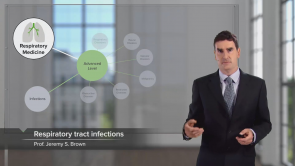

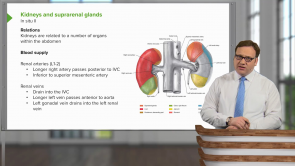
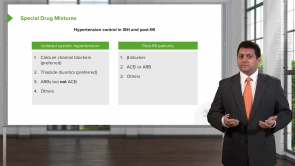

![Renal System [Archive]](https://assets-cdn1.lecturio.de/lecture_collection/image_medium/7484_1545146006.png)
